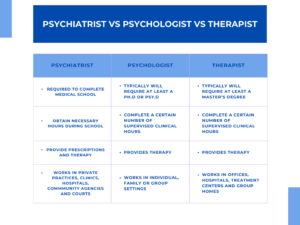Student-centric advice and objective recommendations
Higher education has never been more confusing or expensive. Our goal is to help you navigate the very big decisions related to higher ed with objective information and expert advice. Each piece of content on the site is original, based on extensive research, and reviewed by multiple editors, including a subject matter expert. This ensures that all of our content is up-to-date, useful, accurate, and thorough.
Our reviews and recommendations are based on extensive research, testing, and feedback. We may receive commission from links on our website, but that doesn’t affect our editors’ opinions. Our marketing partners don’t review, approve or endorse our editorial content. It’s accurate to the best of our knowledge when posted. You can find a complete list of our partners here.
How to Become a Psychiatrist
 By
Lisa Freedland
By
Lisa Freedland 
Lisa Freedland is a Scholarships360 writer with personal experience in psychological research and content writing. She has written content for an online fact-checking organization and has conducted research at the University of Southern California as well as the University of California, Irvine. Lisa graduated from the University of Southern California in Fall 2021 with a degree in Psychology.
Full BioLearn about our editorial policies

Maria Geiger is Director of Content at Scholarships360. She is a former online educational technology instructor and adjunct writing instructor. In addition to education reform, Maria’s interests include viewpoint diversity, blended/flipped learning, digital communication, and integrating media/web tools into the curriculum to better facilitate student engagement. Maria earned both a B.A. and an M.A. in English Literature from Monmouth University, an M. Ed. in Education from Monmouth University, and a Virtual Online Teaching Certificate (VOLT) from the University of Pennsylvania.
Full BioLearn about our editorial policies

The path to becoming a psychiatrist is long, yet fulfilling. As you find happiness in pursuing what you love, you’ll learn how to guide others down that same path. Psychiatrists do so by diagnosing, treating, and alleviating or helping prevent their patients’ emotional and behavioral disorders. They use a variety of treatments, including psychotherapy and medication, in order to achieve such goals.
If this sounds interesting to you, keep on reading to learn how to become a psychiatrist!
Don’t miss: Top psychology scholarships
What is a psychiatrist?
Great question! Essentially, psychiatrists are medical doctors who specialize in mental health. They use a wide variety of treatments and strategies, including prescribing medication, in order to help their patients overcome emotional and behavioral disorders. Often, psychiatrists work in teams with medical doctors, social workers, and other professionals.
And that’s the gist of it! However, you may be wondering what exactly makes the psychiatrist profession different from others in the mental health field. If so, let’s take a look.
What is the difference between a psychiatrist, psychologist, and therapist?
There are many professions within the mental health field. Some among them include psychiatrists, psychologists, and therapists. What exactly sets them apart, though? Good question! As they all share some similarities, it’s not uncommon for people to get them confused. So, to clear everything up and make sure you’re on the right track, let’s dissect the differences (and similarities)!
To set the stage, let’s start off with some basic similarities and differences between psychiatrists, psychologists, and therapists:
Now, let’s get into what makes each one unique, starting with psychiatrists.
Also see: How to attend medical school for free
Psychiatrist
If you’ve read up to this point, you probably already have a general idea of what a psychiatrist is. They’re medical professionals specializing in psychiatry or mental health who are able to prescribe medication, something that most other mental health professionals cannot do. Psychiatrists also have the choice of engaging in psychotherapy or “talk-therapy” with their clients, but this role is more often taken on by psychologists or therapists.
In order to become a psychiatrist, one must attain their bachelor’s degree, medical school degree, and complete residency! After becoming licensed and receiving board certification, psychiatrists may also choose to specialize in a number of subfields. We’ll get more into the process of becoming a psychiatrist later, though.
For now, let’s move onto psychologists!
Psychologists
Psychologists typically conduct research, diagnose disorders, and supervise research assistants. They generally only work with patients needing help in their specific field of expertise. They may also teach at universities if they choose to. While psychologists may seem very similar to psychiatrists on the outside, this is only somewhat true. Both work in the mental health field to help their patients overcome their disorders or other struggles, one way or another. However, the professions and the degree pathways are actually quite different.
While psychiatrists must attend medical school and are considered medical professionals, psychologists are non-physician professionals who must complete a doctoral degree (a Ph.D or Psy.D). Thus, psychiatrists typically work with patients while psychologists work with clients. For the last difference, psychologists cannot prescribe medication.
While psychiatrists and psychologists typically take longer to become than therapists, all those extra years of schooling and work open you up to more job opportunities. They also will earn you the title of doctor! Just bear in mind that psychiatrists are medical doctors whereas psychologists are doctors in the sense that they’ve earned a doctoral degree.
Therapists
Last, but certainly not least, are therapists! Therapists most often conduct psychotherapy with their clients through private one-on-one sessions. However, they may also work with specific groups or whole communities at a time depending on their specialization. Some of these specializations include marriage and family therapy, occupational therapy, and adolescent/child therapy.
No matter their specialization of choice, therapists generally need at least a master’s degree. Like psychologists, they typically specialize and see patients in their specific field of practice. If becoming a therapist seems more up your alley, we’d recommend checking out “How to become a therapist”!
And that’s it! We hope that cleared up any confusion. If a psychiatrist was the job you were thinking of, let’s move onto how you can become one!
Step-by-step outline on how to become a psychiatrist
The journey to becoming a psychiatrist takes quite a bit of time: 12 years. Over that time, you’ll be expected to complete your bachelor’s degree, medical school, and even a residency. While this may seem like a very long commitment, just remember that this will help fully prepare you for the job of your dreams. So, let’s start!
1. Obtain a bachelor’s degree
Your first step towards becoming a psychiatrist would be to obtain a bachelor’s of science degree from an accredited university. As for majors, psychology, physical sciences, and any pre-med track are common options. Though, making sure to take and excel in your pre-med courses will likely be more important than the specific major you choose. Thus, we would highly recommend taking courses required to get into medical school such as biology, chemistry, and mathematics.
There are also several other ways to boost your chances of acceptance into medical school during undergrad, including:
- Volunteering at mental health clinics
- Completing an internship at a local hospital
- Joining psychiatric or pre-medical organizations
No matter what you get involved in, we would definitely recommend at least gaining some experience working with patients with mental health issues. This way, you’ll learn how to best help these patients and can confirm whether or not psychiatry is the right career for you.
2. Prepare for and pass the MCAT
Whether during undergrad or right after, your next step would be to prepare for and pass the MCAT (Medical Colleges Admissions Test). This exam is a multiple-choice examination testing individuals on their knowledge of the physical sciences, biological science, oral reasoning, and writing. While medical schools will certainly take a student’s whole application into consideration, passing the MCAT is certainly an important part of it.
Generally, schools will consider a score of 511 (out of 528 total) acceptable. However, specific schools may have higher or lower standards depending on their selectiveness. For this reason, we would highly recommend checking out the typical MCAT scores of students accepted to your
Once you sense you’re ready for the exam, you can sign up on the AAMC website. We would also recommend planning to take the exam at least one year before you start medical school. This is so you’ll have time to take and retake the exam if need be before your applications are due. The MCAT can be taken three times in a single year, four times over the course of two years, or seven years in one’s lifetime.
Alternatively, if you wish to not take the test, just remember that there are also a limited number of medical schools that do not require the MCAT. Make sure that you carefully research any MCAT-free schools beforehand.
3. Complete medical school
Congratulations on your acceptance into medical school(s)! Your next step is to complete medical school and obtain either a Doctor of Medicine (M.D.) or Doctor of Osteopathic Medicine (D.O.) degree. M.D. ‘s typically offer allopathic treatments addressing specific symptoms of a disease. D.O. ‘s, on the other hand, view the body as an integrated entity and address conditions from a variety of lifestyle and medical perspectives.
Typically, medical school takes four years to complete. The first two years normally take place inside classrooms and laboratories where students take classes in subjects like anatomy, pharmacology, chemistry, medicine, and even neuroscience. Once someone reaches their final two years of medical school, they typically are expected to start accumulating some clinical hours and real-life experiences. Your school will likely help arrange this, assigning you to a hospital or clinic where you’ll be required to diagnose and treat medical conditions under the supervision of an experienced physician. Depending on your school, you may also be required to complete a clinical clerkship. These are designed to train you in a variety of specialities, including (but not limited to) surgery, neurology, and family medicine.
Related: Top medical school scholarships
4. Complete a residency
After graduating from medical school, those wishing to become psychiatrists must complete a residency program in a clinic or hospital. Somewhat like medical school, psychiatric residency programs last four years and consist of a combination of lecture-based learning and practical application. However, residencies go further into real-world experience, as students will likely spend most of their time within a clinic or hospital setting. They will also gain much experience diagnosing and treating conditions in patients.
The initial part of one’s residency occurs during general medical rotations. Students can expect to first focus on neurology for a few months, then get into psychiatry. This time learning about psychiatry will likely include a year of inpatient (requiring a patient to stay in a hospital overnight) psychiatry followed by a year of outpatient (not requiring a patient to stay in a hospital overnight) psychiatry. Near the end of your residency, you will be able to study and focus on a particular specialty of your choice.
During one’s residency, they will learn and work with patients with a wide variety of mental health conditions. These may include bipolar disorder, schizophrenia, post-traumatic stress disorder, dementia, depression, obsessive-compulsive disorder, and more.
5. Complete a fellowship (optional)
After finishing your residency, you have the option of completing a fellowship as well. While not necessary in order to become a psychiatrist, finishing a fellowship will allow you to specialize in a subfield of psychiatry. Among these include forensic psychiatry, addictions, child and adolescent psychiatry, geriatric psychiatry, and even psychosomatic medicine.
Luckily, fellowships only take one year to complete! They typically involve a combination of seminars, courses, research, conferences, and some clinical work through assigned rotations.
6. Obtain a medical license
Now’s the time to earn your medical license! In all states, you must obtain a license through your state’s medical board to legally practice psychiatry. While the specific requirements will vary by state, individuals must pass an exam that tests their knowledge of medical practices and state policies. Generally, those who graduate with an M.D. must take the US Medical Licensing Examination (USMLE). Those who graduate with a D.O., on the other hand, normally need to take the Comprehensive Osteopathic Medical Licensing Examination (COMLEX-USA).
To find out your state’s requirements for obtaining a psychiatry license, check out these state-specific requirements for initial medical licensure. Also bear in mind that you may have to register with your state if you plan on prescribing or disbursing medication to your patients.
7. Become board certified
We’re almost done! A recommended next step would be to become certified by the American Board of Psychiatry and Neurology (ABPN). Although this is not required, it helps demonstrate your knowledge and competence in psychiatry. This will look good to patients and employers alike, possibly helping your employment opportunities.
In order to gain certification, individuals must pass required testing, complete training, and meet minimum educational requirements. Medical licensure and completion of a residency program is also needed. Lastly, you must have earned an M.D. or D.O. in order to take the required certification exam in the first place.
Certification is also available for subspecialties of psychiatry, if you’re interested. However, keep in mind that all certifications are valid for 10 years. One must complete continuing education requirements and self-assessments to maintain certification thereafter. Generally, 30 hours of continuing education are required annually. Such requirements keep psychiatrists current with new developments and standards within the field. To learn more about how you can maintain your certification, be sure to check out the ABPN’s “Maintenance of certification program.”
And with that, you’re all set! You’ve now completed all the necessary steps in becoming and maintaining your role as a psychiatrist. Congrats!
As we send you off, we wish you the best in your psychiatry journey. With hard work, you’ll certainly be able to achieve your goals of helping others. Although it may take some time, you’ll learn a lot on the way there. Good luck!
Frequently asked questions about how to become a psychiatrist
How many years does it take to become a psychiatrist?
Do psychiatrists get paid well?
What undergraduate degree should I pursue if I want to be a psychiatrist?
What does a psychiatry residency look like?



